
Friday, August 10, 2012
Friday Night on the Upper West Side: Hudson Warehouse presents "Richard III" at the Soldiers' and Sailors' Monument in Riverside Park
We waited too long, until the last performance last Sunday night, to see the Hudson Warehouse's production of The Rover, so we made certain to be at opening night for the company's spectacular debut of a stirring, bloody Richard III, directed by Nicholas Martin-Smith, whose coherent, seamless melding of character and action give the complex historical drama a stunning depth of meaning.
Having seen a number of excellent Hudson Workshop shows over the last few years, we're always amazed at the high consistency maintained by producing artistic director Martin-Smith (who also played the blithely deluded Hastings tonight), assistant artistic director Susane Lee (who seems to be a master of details), and all the cast and crew, but Richard III is one of the best productions we've been privileged to enjoy. This is Hudson Warehouse's ninth season, and they've been staging three shows each summer -- two Shakespeare plays in June and August, and another classic play in July -- more than any other of the many fine summer free outdoors troupes out there, and they're always a pleasure to watch.
One of those pleasures is repeatedly seeing the same talented actors in a variety of disparate roles, as in the kind of old-fashioned repertory company that we used to hear about when we were kids in the 60s. To watch performers like Amanda Renee Baker, Nick DeVita, David Allison DeWitt, Valerie O'Hara and Margaret Catov in different plays makes one appreciate more how demanding the craft of the actor is.

Vince Phillip, so good as Petruchio in The Taming of the Shrew, here gives a controlled, subtle and chilling performance as Richard III. It's interesting to see his Katherine from Shrew, Amanda Renee Baker, interact with him here as Lady Anne; the scene where Richard, ahem, woos her over her late husband's corpse is usually a highlight of this play, and it's done with style, wit and pathos in this production.
The first and only other time we've seen Richard III was on August 8, 1990. We know that from our book Summer in New York, in which this diary entry appears:

At this point we're a lot more savvy, having read the play several times more, so part of our enjoyment here came from that better understanding of the plot. But we appreciated Vince Phillip's interpretation of the protagonist: Richard comes on as suave and all smiles, and they manage to appear sincere at first, and he remains amiable and ingratiating for a surprisingly long time before darkening, and with each triumph, becoming more and more sinister. This is the bloodiest production we've seen from Hudson Warehouse, and the blood may be a little thin but it spurts out shockingly and forcefully enough that it made us cringe. The machinations of the royals and nobles and their minions here play out like a good Sopranos episode. Margaret Catov plays a sprightly Queen Margaret, whose craziness and revenge fantasies (or prophecies) seem to make her more agile and energetic than anyone else, and a nice contrast to the physically slow-moving Richard III. The other women in the cast also give standout performances. As Queen Elizabeth, Roxann Kraemer, who we saw as Arkadina in last season's The Seagull, maintains a core of dignity and strength even in her plotting, rage, and terrible grief. Valerie O'Hara is a doughty Duchess of York, never letting go of her usual grip of her handbag, very reminiscent of the late Queen Mother Elizabeth in her later years. The scene where she gives her youngest grandson, the Duke of York (played by a bratty, charming Matt Ebling) two lollipops to suck on is priceless. And when a lollipop appears late in the play, sucked on by the psychotic James Tyrrel (a terrifying, charismatic Myles Kenyon Rowland) after he's delighted in the murder of the boy and his brother, who stand in their uncle Richard's way towards the throne, the result is devastating. There are too many wonderful performances to name, but we especially liked R. Scott Williams' bewildered Duke of Clarence, and even more, his flouncy Lord Mayor of London); Nick DeVita as the accommodating Catesby, who seems to know that with a boss like Richard, it's best to look busy and keep moving fast at all times; the pedantic, fussy Lord Rivers played by Jonathan William Minton; Thomas J. Kane as the rather enigmatic King Edward IV, who has a wonderful turn in his wheelchair; Bruce Barton as an unctuous Archbishop; David Allison DeWitt, as the bland, not-so-loyal commanding general Stanley; and George K. Wells, who emerges from the margins to become a forceful, charismatic and powerful Earl of Richmond, who will dispatch the ultimately undone Richard ("My kingdom for a horse!" is pathetically hollow indeed), and end the play as King Henry VII, who unites the Houses of Lancaster and York, ends the long War of the Roses and begins the Tudor dynasty. The play must have been satisfying to Queen Elizabeth and her supporters, of course, in making her family's rise to the throne both legitimate and necessary as Shakespeare hinted that the Tudors were divinely sanctioned to rid England of Richard's evil and all the scheming and killing (which, in historical truth, he was just but another player in). But it can be read in a variety of ways, and the current Hudson Warehouse production, playing this weekend for the next three weeks, provides a lot of food for thought -- on such subjects as the abuse of powerless women, the sanctimony behind establishment religion, the kind of political schemer who will say and do anything to achieve power -- and generally, about the meaning and relevance of Richard III. We're grateful we were first-nighters.
Thursday, August 9, 199010 PM. Yesterday at 5:30 PM, I decided to walk over to Central Park and see if I could get tickets for Richard III. As it turned out, I could have arrived just before the show, but I didn’t mind waiting; instead of standing at the end of the line, I just sat on a bench finishing the Times and got up when they started giving out tickets.I walked back home via Central Park West and 85th Street, and after a quick dinner, I returned, walking just as briskly.Shakespeare in the Park is always a treat, but after seeing Denzel Washington in Mo’ Better Blues and now Richard III, I think he’s an overrated actor. He played Richard in a very traditional way – a hunchback, limp and all – and though the play’s performances were good (especially Mary Alice as old Queen Margaret), the staging wasn’t that interesting.I liked the battle scenes, and of course, Richard’s seduction of Lady Anne over her father-in-law’s coffin, but my remembered knowledge of the War of the Roses is sketchy enough so that it took me too long to catch onto the dynastic maneuverings.
Subscribe to:
Post Comments (Atom)
















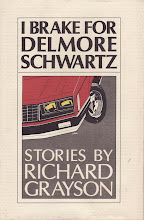
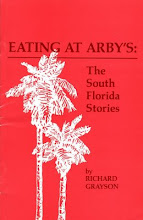
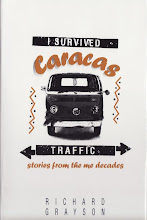


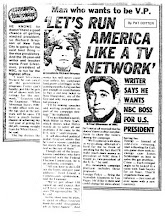







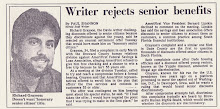








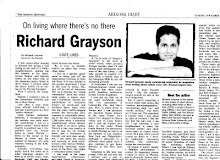




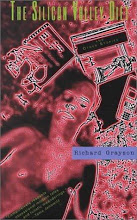

No comments:
Post a Comment